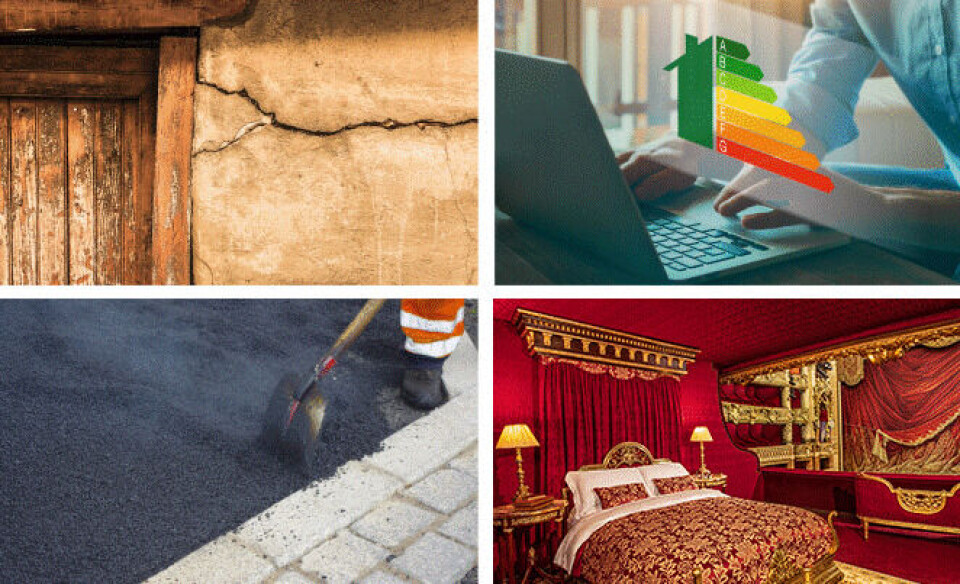-
France’s wild garlic season is here – but foragers should beware toxic lookalikes
Spring brings the fragrant plant to woodlands nationwide. We explain what to look out for
-
Let your lawn grow, water for birds: how to help wildlife in your French garden
‘It is acceptable to have untidy hedgerows,’ says biodiversity spokesperson.
-
How to help hedgehogs in your garden in France
Follow these tips to create a healthy ecosystem for this protected species
Drought damage, septic tank dispute: Five French property updates
We also look at a free online tool to estimate your home’s energy efficiency, a unique chance to sleep at the Paris opera and more

Government paves way for more drought damage claims
More homeowners should soon be able to claim for damage caused by droughts, thanks to government plans to extend eligibility beyond the current criteria.
More than 10 million homes in France are at risk of structural damage from soil contracting during prolonged periods of dry weather, according to the Bureau of Geological and Mining Research – this is more than half the country’s housing stock.
Read more: Ten million homes in France risk structural cracks after heatwaves
However it is difficult for homeowners to claim for damage as this requires the commune to be declared a catastrophe naturelle (natural disaster) zone by the state.
A February 2022 report from administrative court the Cour des Comptes claimed that "over the last nine years, 50% of communal requests for ‘CatNat drought’ recognition have not been successful".
It means that one in two victims is not entitled to claim off their home insurance and lives in a house that is deteriorating, “sometimes to the point of being dangerous to live in”, reports the consumer association Que Choisir.
Read more: What to do if structural cracks appear in your French property
Now, the government is looking to relax the criteria for determining natural disaster status in the case of drought, to "better take into account the slow and progressive nature of the phenomenon of drought and soil dehydration", according to minutes from the Conseil des ministres earlier this month (February 8).
The legislation is subject to the application of further decrees between now and the summer on how best to implement it. From January 1, 2024 at the latest, however, the new rules should increase the number of municipalities eligible for natural disaster status by 15%.
As well as relaxing existing criteria, new measures should allow compensation to be paid to victims located in communes "that have suffered an abnormal succession of droughts of significant magnitude, but whose intensity measured year by year does not meet the current criteria".
The government also wants "better account to be taken of the situation of communes adjacent" to those that have been recognised as natural disasters, it said in a press release, as the current system means that a house located in one commune might be compensated while a house located a few hundred metres away is not.
However, there are constraints on exactly what a homeowner can claim for. Sums paid out can only be used for damage likely to “affect the solidity of the building” or “hinder the normal use of the building” rather than to cover aesthetic damage.
Disputes between insurers and homeowners over drought claims have multiplied in recent years and among the new measures are tighter controls on experts appointed by insurers to assess damage.
The state will carry out checks on their work, and any breach of standards could result in the invalidation of their report, a 12-month ban on practice or a €10,000 fine, depending on how serious the failing is.
In November, the insurance industry federation France Assureurs estimated that drought episodes in France in 2022 alone will likely cost between €1.9 and €2.8billion, a record since the creation of catastrophe naturelle provision in 1982.
Free online tool estimates energy efficiency of your home
It is now possible to get a rough idea of your property’s energy efficiency rating and an indication of work you can do to improve it thanks to a free online tool.
The brainchild of a firm called Effy, which specialises in energy renovation, the tool works by asking homeowners a series of questions about relevant characteristics of their property, including its location, year of construction, size and the type of roofing, insulation and heating system.
This stage should take approximately five minutes.
With the information it can estimate the energy consumption of your home with a letter grade ranging from A for the most efficient homes to G for the least.
Read more: 10 questions about France’s new energy audits for homes
The method it uses is certified by the Agence de l’environnement et de la maîtrise de l’énergie (Ademe) but is no substitute for the diagnostic de performance énergétique (DPE), which is carried out by a professional auditor.
However, it does give a good idea of how you can improve the energy performance of your property, how long that might take, as well as subsequent savings as a result of the work.
Read more: French eco-renovation grants increase as price of materials rises
“We have designed this easy-to-use solution to help as many people as possible understand which energy renovation work is most appropriate for their home," said Effy’s chairman, Frédéric Utzmann.
“It is a complementary tool to the DPE or energy audit, aimed in particular at those who are still hesitant to take the plunge.”
The free tool has launched ahead of new rules on household energy efficiency that will, from April, require some property sellers to show potential buyers what work is needed to boost the energy efficiency of poorly-rated properties.
Read more: Make sense of new energy audits for property in France
From January this year, it has no longer been possible to rent out properties with energy consumption exceeding 450 kWh/m2 per year.
From 2025, this ban will apply to all properties rated G, from 2028 for those rated F, and then from 2034 for properties rated E.
Read more: Home energy efficiency: Key dates for property owners in France
Court rules against homeowner who complained about proximity of neighbour’s septic tank
France’s highest court has ruled that professional standards relating to the position of a septic tank cannot be imposed on a third party, after a plaintiff asked for a neighbour’s tank to be moved.
The homeowner argued that the installation breached guidelines that explicitly state that a septic tank should be at least three metres from a neighbour’s boundary.
Read more: What is law in France on neighbour's trees growing into my property?
The issue arose when the plaintiff noticed waste water seeping into one of their buildings, and traced the cause back to a broken drainage pipe from a septic tank installed on the neighbour's land.
However, the Cour de cassation ruled last month (January 18) that the homeowner could not make his neighbour move the septic tank as, despite being less than three metres from the properties’ boundary, it was installed within the relevant legal rules.
The judges explained that the document technique unifié (building standard) containing the three metre guidance concerned best practice and was not a legal obligation. The tank had been installed within the relevant set of professional rules and thus could stay where it was.
Read more: French gutter rules stop rainwater soaking the neighbours
The case did not stipulate if the position was due to technical constraints, such as rocky ground, limiting the choice of position.
The judges added that compliance regarding the three metre boundary distance can only be demanded if it is agreed in advance.
Paris opera house available on Airbnb

A room in Paris for under €40 is remarkable enough, but for one night this summer you can bed down in the city’s most iconic opera house to boot.
Short-term holiday let platform Airbnb has teamed up with the Palais Garnier to offer two guests an enticing accommodation package in the building’s Box of Honour on July 16.
The box, normally reserved for visiting dignitaries, will be lavishly transformed to include a double bed and gilded furniture.

The stay also includes a tour of the Palais, including its private archives and famous underground lake, an introduction to ballet with one of the Opera de Paris dancers, an exclusive recital performed by the artists of Paris Opera Academy, and dinner in the Foyer de la Danse rehearsal room behind the stage.
The Airbnb package has been launched to coincide with a 15-country run of The Phantom of the Opera, the musical whose story is inspired by the Palais Garnier.
The stay will be ‘hosted’ by Véronique Leroux, the great-granddaughter of Gaston Leroux, who wrote the original The Phantom of the Opera novel.
In a nod to the Box of Honour’s number, the experience will be priced €37 (plus taxes and fees).
Read more: Tourism tax: €148m paid to French communes from Airbnb stays in 2022
Airbnb stresses that this is not a ‘competition’. Instead, anyone interested can book on a first-come-first-served basis from March 1 at 17:00 BST at airbnb.com/opera.
The listing advertises towels, bed sheets, soap and toilet paper among the ‘essentials’ provided, with air conditioning and security cameras among other amenities.
Not included is a kitchen, wifi, TV, washing machine, hairdryer, shampoo or private entrance, it states.
Only those with a verified Airbnb profile, a good track record on the platform and over the age of 18 will be eligible to book.
The maximum occupancy is two persons and the press release reminds guests that they are responsible for their own transportation to and from Paris.
Read more: Airbnb host and company fined €189,000 for illegal rental in Paris
Airbnb is supporting an ongoing project to restore the Palais Garnier boxes and fund the development of the Opera’s streaming platform.
It is the latest in a series of gestures by the accommodation platform to revitalise heritage tourism in Europe, including donations to historic home organisations.
Garden groundwork not always covered by home insurance
Claiming for damage to garden groundworks under your home insurance may not be as straightforward as imagined, a recent court case has shown
While garden goods, domestic outbuildings such as sheds, and walls, gates, fences and driveways are often included in home insurance policies, the contract may not cover any necessary repairs of the ground on which they are installed.
However, France’s highest court, the Cour de cassation, ruled last month (January 19) that unless the policy wording explicitly excludes this, it should be possible to make a claim.
The judgement came after an insurance firm refused to pay out in full for repairs to a homeowner’s access road, which had been damaged by heavy rain.
Despite the weather incident having been declared a catastrophe naturelle (natural disaster) by the state, which allowed the homeowner to make a claim, their insurer said they would only pay for the surface covering of the path, not the earthwork needed first.
Read more: France’s ‘catastrophe naturelle’ insurance system: how to claim
The court ruled against this, insisting that "since the insurer promises to cover the cost of rebuilding, it must naturally cover the cost of repairing the land that serves as the necessary support”.
“There can be no reconstruction [of this road] without repairing the earthwork, which has also been damaged,” it said.
However, the judges also warned "this policy could have expressly excluded the earthworks".
If such a clause had been in place, they said, the homeowner would have been forced to accept his insurer’s decision.
Related articles
Illegal doorbells, heat pump accident: Five French property updates
What aid is available to install home solar panels in France in 2023?
What is France’s empty homes tax and why more people will be paying it
























